Tom King explains how Pariah is making a "classic Superman mistake"
Dark Crisis: Worlds Without a Justice League - Superman #1 writer Tom King and artist Chris Burnham explore the core concepts of the one-shot special
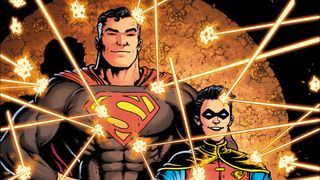
As far as everyone on Earth-Zero is concerned, the Justice League is dead – but in reality, Pariah has used the team's essences to start creating a brand new multiverse. Each of these worlds is based on an individual hero, and for some, it feels like absolute heaven – at a cost.
Dark Crisis: Worlds Without a Justice League - Superman #1 is the first in a series of one-shots exploring these "happiness prisons," as described by Dark Crisis writer Joshua Williamson, and the story follows Clark Kent in a world where he gets to see his son, Jon, actually grow up rather than rapidly aging.
However, this world also has its flaws: Superman and Superboy are the only heroes, Darkseid has conquered most of the universe, and war creeps around every corner. Plus, Clark remembers his life on Earth-0, which makes his happiness in this world even more complicated.
We spoke with writer Tom King and artist Chris Burnham about Dark Crisis: Worlds Without a Justice League - Superman #1. Read on for their thoughts on the story.
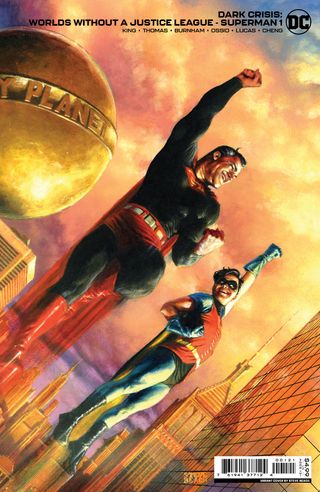
Samantha Puc for Newsarama: Tom and Chris, what were the most important story elements you wanted to include in this issue no matter what?
Tom King: It's hard to think of just one of the story moments. The most important thing from the beginning was the idea that Jon had gone from age 12 to age 18 in a flash and Superman had missed those years. As a father, I always felt that those were kind of torn away from him.
The most important thing I wanted to do was restore those years to the audience because Superman had missed those and we had missed those. I very much as a fan wanted to see them and as a father wanted to write them. So it was creating small, teenage moments, but there wasn't one moment I'd be able to cut out.
Comic deals, prizes and latest news
Get the best comic news, insights, opinions, analysis and more!
Chris Burnham: I wanted to be sure to draw Superman saving someone. Most of the time in Batman, he's just beating people up. I don't get to draw superheroes saving many people, but I made sure to have Superman save a little girl from a giant robot. The script is that they're fighting the giant robot, but I had to make sure he was explicitly saving someone. I wanted to get that in there.
Nrama: Speaking of the visuals, how do you layer the sinister undertone of Pariah's "happiness prison" with this very clearly happy life for Clark, Lois, and Jon? Was that difficult?
Burnham: I guess I was just trying to draw as classically iconic versions of their house and the farm, and I just happen to draw kind of ugly and sinister if I'm left to my own devices. Apparently, it worked for you, so hopefully, it works [for everyone].
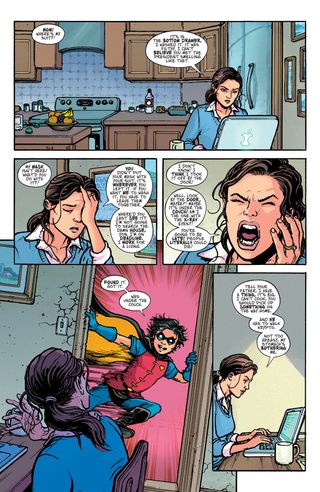
Nrama: How did you balance the characters' knowledge of what came before with their lived experiences in this timeline?
King: The problem with this story is that Superman's done this before. He's been in this trap before, very famously, in 'The Man Who Has Everything,' written by Alan Moore 30 years ago. The plot of that issue is his ideal world crumbling, turning into fascism, as a symbol of his mind fighting back against the ideal world.
I really didn't want to do that. Alan Moore had done it and already had done it well. I wanted to just do the trap and show that Superman's ideal is not some sort of Donna Reed version of life where everything is perfect and wonderful. His ideal is to live a human life, to live a life that's a little bit messy, where other people are free.
Superman doesn't want to live amongst robots. He wants to live in a world where people are at liberty to be themselves. That's his ideal. It's not some sort of fascistic thing, it's built on liberty and freedom.
Nrama: Do you think Clark would retain any memories of this place if he were restored to life on Earth-Zero?
King: I think so. You know what? This is the best answer: If the audience remembers, if Chris and I did our jobs, and we touched an emotional place in the audience where this story hits them, then writers who write Superman will be forced to address that emotion.
So I'm going to say yes to that because I think Chris and I did do our jobs and I'm really proud of this issue. I think this is going to create some kind of emotion in the audience that writers including myself will have to respond to. That's kind of an arrogant thing to say, but I'll project my ideal world.
Burnham: I like that.
Nrama: How much did you guys know about Dark Crisis going in?
Burnham: Is there a number less than zero?
King: [Dark Crisis writer Joshua Williamson] is one of my closest friends in comics. We almost have a scheduled weekly phone call. Josh has scheduled weekly phone calls with most people, which is how the DCU sticks together. He's almost the glue that keeps us all together. So he's been telling me about Dark Crisis for like the whole year now, and he's very accessible. I can just text him if I have any questions.
I did text him halfway through because he was like, 'Create an ideal world!' And I created a world where Darkseid had conquered most of the universe and it starts off with a pair of demons tearing people apart. I was like, 'I don't know if I did this right.' He said, 'No, no, no, no, you're still on track.' So that was good. Josh is very sharing with his stories, so I at least knew how Dark Crisis ends and where it's going because he goes over the story with me.
Burnham: All I know is that I drew a cover with Pariah on it, so Pariah is involved in some way. I'm sure if I asked, they would tell me, but it's not really germane to the story for me. I'll read it when it comes out.
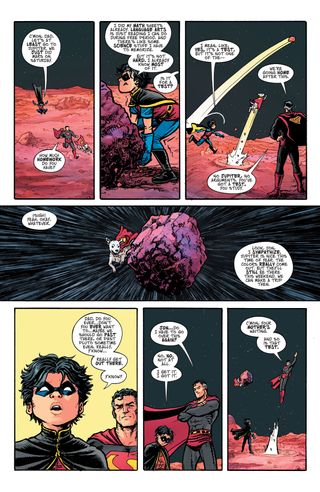
Nrama: Assuming this character has to face a decision between staying in this world and going back to the main DCU, how hard do you think Clark would be willing to fight to keep this life?
King: That's going to be the continued line of the whole story. It's very self-contained. It's a story about these missing years and what it's like to raise a teenage son and have them rebel and not rebel, but the 'to be continued' of it is, having experienced this joy, can Superman take that away from him in order to save the world?
That's who Superman is. You know he's going to do it because his own pain is less important to him than our joy. He will take that blow, just like he's taken blows for 85 years, but it's going to be hard on him. It's going to be one that lands and lingers.
Nrama: When it came to drawing Jon as a sidekick figure to his dad, how did you go about deciding how you were going to present him and what his costumes were going to look like?
Burnham: The immediate brief was, 'Make a Superboy who basically looks like Robin.' Initially, it was just taking the Robin costume and putting blue in there instead of green, but then it didn't feel quite right, so we incorporated some elements from the Tim Drake Robin to darken it down a little bit. It immediately felt right, and then I tried 20 different variations just to make sure I was right.
It was as simple and difficult as that. Sometimes, a mash-up works perfectly, and sometimes you have to struggle to make it fit, but it fit immediately. It's such a clear image. What if Superboy looked like Robin? I'm sure you've got an image in your head of what that is. I basically just drew that, but with a black cape instead of yellow.
Nrama: Would either of you ever be interested in revisiting this world, even though it's not exactly real? Are there more stories to tell?
King: As long as Chris is drawing it, yeah. I feel like you could write a whole 100-issue series about Clark Kent and Jon during those teenage years. We're getting Super Sons content when he's 12 and we're getting Jon Kent content now that he's 20, but I feel like we're missing six key years of a person's life. When I realized, OK, I have to cover this in 20 pages, it wasn't hard looking for stories. You could find stories everywhere.
And what a fun world. It's kind of a destructive world, but what a fun world where Superman is the only superhero and can only protect so much, so he has to let some stuff go. That's a wonderful premise.
Burnham: Yeah, those agonizing decisions are great. Trolley problems all over the place.
King: You can imagine he's just like, 'Crap. I just have to let Gotham be crappy. That was Batman's job. Nobody's doing that now.'
Burnham: I want to draw that page now. Just him flying over Gotham saying, 'Sorry guys.'
King: 'Sucks to be you! Wish you had a millionaire to help you!'
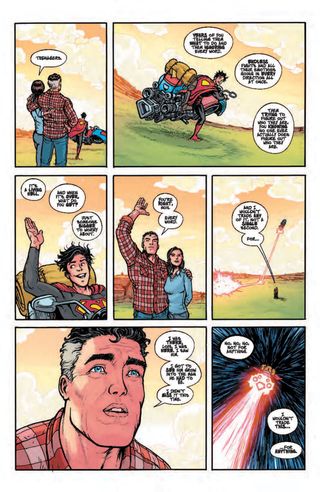
Nrama: What do you hope readers take away from Dark Crisis: Worlds Without a Justice League - Superman #1?
Burnham: Hopefully they get that bittersweet feeling in the pit of their gut.
King: I don't think we teach people lessons or anything, but I hope they connect with [the idea that] when you're raising a kid, you have to realize they're not you and you're not them. They have to become their own person. I hope people connect with that because it connected with me.
Nrama: Do you think Pariah is exploiting Clark's love for his son as a weakness?
King: Absolutely, but that's probably why Pariah is underestimating him because exploiting Superman for love... That's his ultimate strength. You may think you're going to find weakness there, but it's like exploiting Batman for being sad about his parents. It's not going to end well for you. That's where Superman lives. I think Pariah is making a classic supervillain mistake that will come back to haunt him.
Dark Crisis: Worlds Without a Justice League - Superman #1 is on shelves now.
Don't miss the best Superman stories of all time.

Samantha Puc (she/they) is an editor at Newsarama and an avid comics fan. Their writing has been featured on Refinery29, Bitch Media, them., The Beat, The Mary Sue, and elsewhere. She is currently pursuing a Master of Fine Arts degree in creative nonfiction at The New School.
Most Popular


